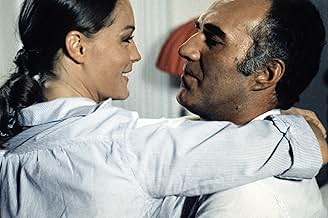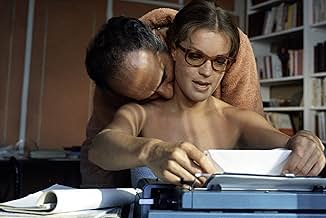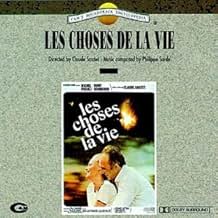VALUTAZIONE IMDb
7,4/10
5984
LA TUA VALUTAZIONE
Un ingegnere autostradale è coinvolto in un incidente stradale, dopodiché, vicino alla morte, ricorda la sua vita precedente all'incidente.Un ingegnere autostradale è coinvolto in un incidente stradale, dopodiché, vicino alla morte, ricorda la sua vita precedente all'incidente.Un ingegnere autostradale è coinvolto in un incidente stradale, dopodiché, vicino alla morte, ricorda la sua vita precedente all'incidente.
- Regia
- Sceneggiatura
- Star
- Premi
- 1 vittoria e 2 candidature totali
Recensioni in evidenza
While it's hardly the only film to have ever played with a non-linear narrative, still it takes a little bit to get a grasp on the proceedings as they go back and forth, and requires active viewership. With this in mind the tack is especially useful for 'Les choses de la vie' as at its core the story is relatively simple - simple, but nonetheless engaging and enjoyable. Even setting aside the hops to and fro in time I take issue somewhat with the sequencing insofar as it initially lends to a sense that the picture is having a hard time finding the right tone; I think another imperfection also rears its head in a few instances of dialogue that are better at conveying a broad mood than specifically speaking to characters' relationships or goings-on. For any idiosyncrasies or subjective faults, however, by and large the finished product is quite good - and in fact in the latter half the same sequencing that marks some roughness in earlier scenes is essential in producing the sparks of brilliance in later ones that help to elevate the movie to another level.
Framed in no small part as recollections and flashbacks following an accident, the picture is a loose but calculated portrait of a man figuring out what he wants in life, and the drama and tragedy that upend it. As such the film relies heavily on the strength of Claude Sautet's direction, and even more so on the performances of the cast. The acting is restrained yet characterized by controlled, nuanced range and emotional depth, tact and subtlety that comes across even where voiceover is employed. Michel Piccoli, Lea Massari, and Romy Schneider are all excellent, and audiences would certainly expect no less from them; those in smaller supporting parts are just as swell, though, in breathing life into the tableau. If more significant in select bits and pieces, Jean Boffety's cinematography and even more so Jacqueline Thiédot's editing are terrific, sharp and shrewd in heightening the impact of some moments, or in the latter half being a substantial source of it as the sounds of urgency are painfully contrasted with far brighter imagery.
In all other regards 'Les choses de la vie' is wonderfully well done, including not least the sparing but exquisite original music of Philippe Sarde that lends to the poignancy of the sorry tale. The stunts, effects, and special makeup that dominate in the pivotal car crash are superb, and the feature can claim fantastic production design generally. The costume design, hair, and makeup are lovely across the board. And, yes, I think the writing is uneven in terms of the approximate second half carrying the overwhelming majority of the meaningful weight of the story, while earlier scenes are mildly insufficient to that same end. Be that as it may, more than not the screenplay proves itself over time: characters and the relationships between them are given all the definition they require to round out careful scene writing, and the meticulous construction of the narrative is just as if not more important than the beats themselves to letting its gravity ring out. The film may not be flawless, but for what it does well, it more than compensates for any perceived issues.
When all is said and done the title is more compelling and satisfying than I was ready to give it credit for at first; the value may be primarily shifted to the back end, but it's very much worth it. All the same I don't know if I'd go so far as to say that Sautet's movie is an outright must-see, unless perhaps one is a big fan of someone involved - but it still stands as a fine testament to the skills and intelligence of all on hand. Well made all around, ultimately the writing and editing actually leap out just as much as the acting and direction does from the get-go, and marginal imbalance is easily forgiven. If you have the chance to watch, 'Les choses de la vie' is a great drama that's worth checking out.
Framed in no small part as recollections and flashbacks following an accident, the picture is a loose but calculated portrait of a man figuring out what he wants in life, and the drama and tragedy that upend it. As such the film relies heavily on the strength of Claude Sautet's direction, and even more so on the performances of the cast. The acting is restrained yet characterized by controlled, nuanced range and emotional depth, tact and subtlety that comes across even where voiceover is employed. Michel Piccoli, Lea Massari, and Romy Schneider are all excellent, and audiences would certainly expect no less from them; those in smaller supporting parts are just as swell, though, in breathing life into the tableau. If more significant in select bits and pieces, Jean Boffety's cinematography and even more so Jacqueline Thiédot's editing are terrific, sharp and shrewd in heightening the impact of some moments, or in the latter half being a substantial source of it as the sounds of urgency are painfully contrasted with far brighter imagery.
In all other regards 'Les choses de la vie' is wonderfully well done, including not least the sparing but exquisite original music of Philippe Sarde that lends to the poignancy of the sorry tale. The stunts, effects, and special makeup that dominate in the pivotal car crash are superb, and the feature can claim fantastic production design generally. The costume design, hair, and makeup are lovely across the board. And, yes, I think the writing is uneven in terms of the approximate second half carrying the overwhelming majority of the meaningful weight of the story, while earlier scenes are mildly insufficient to that same end. Be that as it may, more than not the screenplay proves itself over time: characters and the relationships between them are given all the definition they require to round out careful scene writing, and the meticulous construction of the narrative is just as if not more important than the beats themselves to letting its gravity ring out. The film may not be flawless, but for what it does well, it more than compensates for any perceived issues.
When all is said and done the title is more compelling and satisfying than I was ready to give it credit for at first; the value may be primarily shifted to the back end, but it's very much worth it. All the same I don't know if I'd go so far as to say that Sautet's movie is an outright must-see, unless perhaps one is a big fan of someone involved - but it still stands as a fine testament to the skills and intelligence of all on hand. Well made all around, ultimately the writing and editing actually leap out just as much as the acting and direction does from the get-go, and marginal imbalance is easily forgiven. If you have the chance to watch, 'Les choses de la vie' is a great drama that's worth checking out.
French films are famous for their depiction of minor incidents which converge at a larger point to make up the most of what happens in the lives of people. This helps viewers to have a better idea of protagonists' lives. French director Claude Sautet chose to base his film on this premise as he films the personal as well as professional lives of a successful yet unhappy man. From a career point of view, actor Michel Piccoli is shown as somebody doing well in life as he is appreciated by everybody around him. However, his personal life is in turmoil as he is unable to decide between his wife and his mistress. As he is about to solve this dilemma, a tragedy unfolds in his life. This is hardly the description of an original story but what makes the film interesting is how it has been shot. Apart from describing in detail minor incidents related to the lives of protagonists, Claude Sautet has used all his imagination to film the accident scene which occupies a large part of this film's screen space. Finally, once the film is over, some viewers might be tempted to call it the most important moment of the film.
"Les choses de la vie" is the ultimate "mid life crises" movie. A middle aged man must (but can not) choose between his younger girl friend on the one hand and his ex wife and son on the other hand. As a result he gets irritated and frustrated. He smokes heavily and drives aggressively.
Michel Piccoli wonderfully impersonates this character (Pierre Berard). It was a good choice of television channel "Arte" to select this film in memory of Michel Piccoli, who died in may 2020 at the age of 94.
"Les choses de la vie" also was the film in which director Claude Sautet changed from "crime" to "drama", and especially the drama of the middle class. He so became a sort of French Ozu. But where the middle aged Japanese man above all is interested in the marriages of his daughters (or the lack thereoff), the European middle aged man tries to prove that he is still capable by taking a younger mistress.
Sautet tells the story in a peculiar chronological order. Center piece in the movie is a car accident with Pierre as its victim (after all he was driving aggressively). Just like a stone thrown in the water gives wrinklings moving in ever wider circles, the injured Pierre has memories that go further and further back in time. At the end there is no clear distinction anymore between memories and dreams.
Michel Piccoli wonderfully impersonates this character (Pierre Berard). It was a good choice of television channel "Arte" to select this film in memory of Michel Piccoli, who died in may 2020 at the age of 94.
"Les choses de la vie" also was the film in which director Claude Sautet changed from "crime" to "drama", and especially the drama of the middle class. He so became a sort of French Ozu. But where the middle aged Japanese man above all is interested in the marriages of his daughters (or the lack thereoff), the European middle aged man tries to prove that he is still capable by taking a younger mistress.
Sautet tells the story in a peculiar chronological order. Center piece in the movie is a car accident with Pierre as its victim (after all he was driving aggressively). Just like a stone thrown in the water gives wrinklings moving in ever wider circles, the injured Pierre has memories that go further and further back in time. At the end there is no clear distinction anymore between memories and dreams.
10rutel
Yesterday (Dec 15, 2001 I saw "Intersection" (with Richard Gere and Sharon Stone), so, I immediately wanted to see the original and ... there is no place like home. I went to a Blockbuster and, once again, the original is much better. Try to see it and you wont regret
With "les choses de la vie" ,Claude Sautet relinquished his former style ,film noir ("classes tous risques" "l'arme à gauche" both worth seeking)in favor of bourgeois psychological dramas .
"Les choses de la vie" was the first link on the chain,and -with the exception of "Max et les ferrailleurs" (1971),which showed Sautet at the height of his powers,when he came back for a short while to his first inspiration-remains the best of this "cinema de qualité".
Unlike the other works ("Mado" "Cesar et Rosalie" "Vincent,François,Paul et les autres" "une histoire simple" ,etc etc etc) ,"les choses de la vie" has an emotional power and an unusual inventive direction.Editing is stunning (the first picture is one wheel of the car ),and never a car accident was filmed with such mastery.Flashbacks are used with great skill too.The nightmare scene (the wedding) remains very impressive today.And the metaphorical way Sautet uses to depict the hero's death commands respect and admiration.The last part of the movie is almost completely silent,but the strength of the pictures and the actors' talent (Piccoli,Schneider,but Lea Massari and Jean Bouise too)work wonders.Superb score.louis Delluc prize.
Remake :"intersection" featuring Richard Gere.As I cannot say something nice...
"Les choses de la vie" was the first link on the chain,and -with the exception of "Max et les ferrailleurs" (1971),which showed Sautet at the height of his powers,when he came back for a short while to his first inspiration-remains the best of this "cinema de qualité".
Unlike the other works ("Mado" "Cesar et Rosalie" "Vincent,François,Paul et les autres" "une histoire simple" ,etc etc etc) ,"les choses de la vie" has an emotional power and an unusual inventive direction.Editing is stunning (the first picture is one wheel of the car ),and never a car accident was filmed with such mastery.Flashbacks are used with great skill too.The nightmare scene (the wedding) remains very impressive today.And the metaphorical way Sautet uses to depict the hero's death commands respect and admiration.The last part of the movie is almost completely silent,but the strength of the pictures and the actors' talent (Piccoli,Schneider,but Lea Massari and Jean Bouise too)work wonders.Superb score.louis Delluc prize.
Remake :"intersection" featuring Richard Gere.As I cannot say something nice...
Lo sapevi?
- QuizCigarette count: 46
- BlooperIn the car crash scene, the stunt double for Michel Piccoli is seen wearing brown gloves in close-ups. However Piccoli is bare-handed while driving.
- ConnessioniFeatured in Claude Sautet ou La magie invisible (2003)
I più visti
Accedi per valutare e creare un elenco di titoli salvati per ottenere consigli personalizzati
- How long is The Things of Life?Powered by Alexa
Dettagli
Botteghino
- Lordo Stati Uniti e Canada
- 5063 USD
- Lordo in tutto il mondo
- 5063 USD
- Tempo di esecuzione1 ora 29 minuti
- Mix di suoni
- Proporzioni
- 1.66 : 1
Contribuisci a questa pagina
Suggerisci una modifica o aggiungi i contenuti mancanti






























